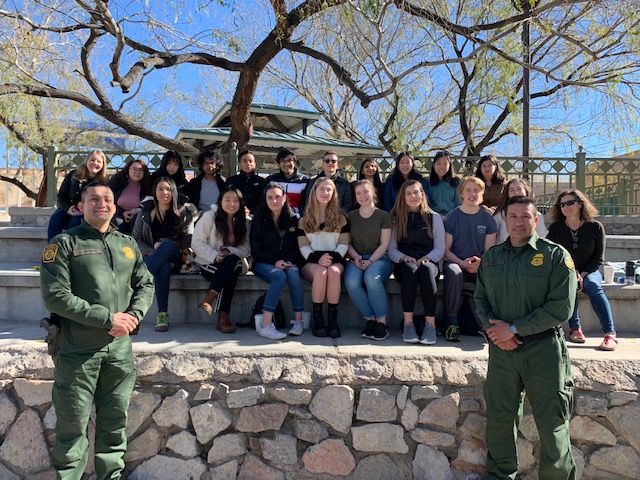
Border Trip: Day 2
Post by Kate Maro and Bridget Boerger. Colgate Class of 2022.
Today our class got the opportunity to hear two opposing sides of the story on immigration at the southern United States border. We heard from two Border Patrol agents and Ruben Garcia, the director of Annunciation House.
To start the day, we met with Agent Antúnez and Agent Mena, both of whom have worked under Customs and Border Patrol for more than a decade. They focused largely on the importance of their positions: to serve and protect. They claimed that they and their agency are an apolitical apparatus of the Department of Homeland Security. At the southern border, Border Patrol covers 264 miles of river and land borderlands. Before Fiscal Year 2019, BP agents would patrol the border as well as highway checkpoints (which serve as a second line of defense). However, beginning in December 2018, large amounts of migrants began coming through the border in chunks. The increased quantity and frequency of crossings caused several sections of borderlands to go unpatrolled in favor of assigning agents to the busier ports. This practice created weaknesses in border security. Cartels, specifically the Sinaloa Cartel, took advantage of the opportunity to traffic drugs across the border and into all regions of the United States. The prevalence of drug activity has in turn led some agents to question the motives of asylum seekers coming into the country. It was around this time when the Family Separation Policy came into effect. The agents we spoke to very carefully portrayed themselves as empathetic to the plight of migrants, characterizing separated children as only present in cases of criminally-charged guardians or drug trafficking. They instead chose to speak on their lack of resources, so as to soften our view of their jobs. They claimed it was not a crisis, but instead a time that necessitates greater attention to border traffic and funding of resources.
When our group visited the church at Cristo Rey Lutheran we saw an accomplished humanitarian speak. He set up the Annunciation House and he spoke publicly against the actions of the Trump administration when the president visited. He spoke to the group about the disintegration of common sense and a nation wide shift in ideals that places our own need in front of the needs of others. He offered a metaphor about going to a mall, and seven billion people also being in the mall at the same time. That is not desirable for anyone and because every space cannot house everyone, people have to be kept out. A way the administration has kept people out of the country is a tactic called metering. The law states that individuals have the right to present themselves to a country to ask for asylum, and the administration is limiting ways for people to ask. Border patrol claims that they are unable to process the waves of migrants that come so they must deny people from asking for asylum. This goes against international laws and is being fought in the court. There is some truth and some lies about the space the border patrol had for housing migrants. Migrants are crammed into small rooms with only a single toilet with no walls while they have larger rooms available. They choose not to use that space due to the minimal possibility of an earthquake or another natural disaster. Families try to leaf ally claim asylum at the port of entry and are usually turned away, which then leads them to cross illegally, which allows the border patrol to criminalize the families. Since children cannot be put into prisons they are separated from their family. This is how family separation started and is still affecting families caught in the system. Mothers are never told where their children are and they are constantly dehumanized by the prison system. The physiological effects of family separation are deep and the speaker does immense work to help these families when they have been through this tragic ordeal.